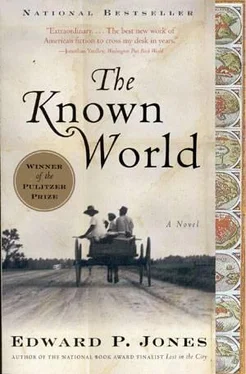9 States of Decay. A Modest Proposal. Why Georgians Are Smarter.
Darcy and Stennis and the people-including Augustus Townsend-they had stolen reached South Carolina in less than two weeks. Stennis had dumped the dead child, Abundance, on the side of the road long before they hit North Carolina, the child who had been coughing since Manchester. “We should bury that poor baby,” the chained Augustus said as Stennis got back in the wagon after dropping the girl’s body in the weeds. Augustus had held the dead child for miles, not wanting to believe she was dead. “Don’t leave that poor baby out there like that.” Darcy and Stennis had kidnapped Abundance Crawford, a free girl suffering from a cold, as she walked down a road outside of Fredericksburg in her new shoes. She would have turned nine years old in two more weeks.
”Should we bury her, Stennis?” Darcy said.
“Ain’t got no shovel, Marse,” Stennis said.
“I’ll do it,” Augustus said. “I’ll dig her a grave with my hands. Just gimme some time.”
The people in the back of the wagon with Augustus said they would help him dig a grave with their hands. Those people were two men and one woman. All of them, except for Augustus, would be sold before the wagon reached Georgia. The two men were Willis, a thirty-seven-year-old brick maker who had one leg shorter than the other, and Selby, a twenty-two-year-old baker who five weeks ago had married a woman whose hair went down two feet beyond her neck. Those two men had been free people, like Augustus. The woman was Sara Marshall, a twenty-nine-year-old seamstress whose master and mistress had given her their last name ten years before. “Don’t bring shame to our name, Sara,” they had said in a kind of ceremony in their kitchen. “Always bring honor to our name. The Marshall name stands for something in this land.”
“Don’t know bout no buryin, Marse,” Stennis said of the child Abundance, “gettin them chains off and on. Watchin em so they don’t run away. Lotta trouble for somethin that won’t cause no more trouble in this world.”
“Well,” Darcy said, “if you don’t know, how am I to know? Push on, Stennis. Push on.”
In North Carolina, as they approached Roxboro, Augustus asked if Darcy might not send a telegram to Mildred, “my worryin wife,” and let her know that he was alive. Darcy asked Augustus if he knew that sending a telegram would mean a loss for his pocket and told him that a careful man of business would try to cut down on losses as much as possible. A telegram was a loss, he said, adding that it was better that “poor Mildred” think he had just ascended to heaven due to his good nature. In Roxboro, Willis the brick maker shouted to a passing white man that he was free and had been kidnapped. Darcy grinned at the white man and said, “We done had this problem with him since Virginia.” The man nodded.
It was in South Carolina, at Kingstree, at the Black River, that Augustus decided that he would do as little as he could to help his kidnappers, but beyond that he was helpless. By then, way before Kingstree, Selby the baker was gone for $310 and Sara Marshall was gone for $277 and an early-nineteenth-century pistol that Darcy was to learn only worked when it wanted to. Sara’s buyer thought it amusing that she had a last name. “Shows her good breedin,” Stennis said to the buyer. And there at Kingstree, Willis began to lean forward all the time, his chest over his thighs and his face in his hands. “We gon get outa this,” Augustus kept telling him.
Darcy went up to a man in Kingstree as the man came out of his house. The house was on the only street in the place. “Might you be interested in some good nigger flesh,” Darcy said and took the man back down to the end of the road and around to an alley where the wagon of people was. Darcy had the man by the elbow the whole time and the man had not protested. Stennis brought Augustus down from the wagon. Willis did not raise his face from his hands.
The man had the look of someone who did not have anything better to do at that moment. He said to Augustus, “Open your mouth.” He himself did not own any slaves but had been to enough auctions to know that having a slave open his mouth was one of the first things a potential buyer did.
Augustus mumbled and put his open hand to the back of his ear. He mumbled some more.
“Why, hell, this nigger’s deaf and dumb.”
“The devil you say?” Darcy said.
“The devil he say, Marse?” Stennis said.
“I tell you he can’t hear and he can’t talk. Can you?” the man said to Augustus, who looked at him expressionless, his hand still to the back of his ear. “What kinda flesh you tryin to peddle, mister?”
“No no. He hear, he talk,” Darcy said. “He was talkin and hearin in Virginia. He was talkin and hearin in North Carolina. He can hear and he can talk, I’m tellin you.” Then, to Augustus, “Open your mouth and tell this white man howdy, tell him that it’s a good goddamn afternoon.”
Augustus mumbled and put the other hand to the back of his other ear. The white man looked from Augustus to Darcy and then to Stennis. “Well, it must not be a good goddamn afternoon cause he ain’t tellin me so.”
“He ain’t deaf and dumb. You got my word on that,” Darcy said. “Can’t he talk, Stennis?”
“Yes, Master. He can talk. He can talk clear as a bird singin in the tree, clear as-”
“All right, Stennis, thas anough of that. I wouldn’t lie to you, mister.”
“I don’t want a deaf-and-dumb nigger. I want a whole nigger, top to bottom.”
The man turned to go and Darcy pulled at his sleeve. The man said, “Unhand me, sir, or I will hand you to God.” Stennis grumbled loudly. Darcy stepped back and the man went away. Darcy said to Stennis, “You know better than to bark at a white man, even one thas an unwillin customer.”
He turned on Augustus and poked him in the chest with two of his fingers. “What is the gallumpin about you, nigger? You ain’t no more deaf and dumb than Stennis is. What is the gallumpin?” Augustus said nothing. “You done lost your hearin here in South Carolina, that it? Lost your tongue, too, huh? What did you lose in North Carolina? Your pecker? And Virginia, your brain, what little there is of it? And what it gonna be in Georgia? Your arms? And then your legs in Alabama and Mississippi, if we git that far? Just wastin away with every state we come to. That it?” Darcy looked at Stennis. “I bet if we got him to Texas, he’d be gone altogether, Stennis. Just a puff of nothin by the time we got to Texas. And wouldn’t that be a shame? That would be a damn shame. Cause they don’t pay a whole helluva lot for a ghost nigger in Texas.”
“What we gon do?” Stennis said.
“We gon carry on, Stennis. We gon carry on till all the birds fall from the trees.” He spat, then picked up the foot of one of the dead beavers hanging from his chest and inhaled it deeply. “Tennessee is a good place to be this time of the year, Stennis. The air will carry you along, wherever you wanna go.” He dropped the beaver’s foot and poked Augustus again. “And we gon sell this here nigger if I have to throw in my father and grandfather and his father with the bargain. Les go.” Stennis yanked on Augustus’s chain, picked him up and tossed him into the wagon. Darcy picked up another beaver foot and most of the leg and inhaled deeply again. “The air of Tennessee will cure all that ails you, Stennis.”
“I can smell it from here, boss.”
In Charleston they sold Willis for $325. Darcy would have gotten $400 but the white man and his wife, both schoolteachers, were suspicious of the papers Darcy had on Willis. Holding the papers, the woman said that her father had been in the slave business and so she knew that no price was eternal. “Three hundred and twenty-five,” she said, and her husband repeated what she said. “I was a free man in Virginia,” Willis said quietly to the teachers after the price had been agreed upon. Darcy laughed. “He keep saying that,” Darcy said, snickering. “Virginia a beautiful place. We all feel free there. It’s God’s parlor, but he forgets this ain’t Virginia.” He was implying something unkind about South Carolina, but the teachers did not seem to notice. As Darcy and the teachers stood outside the bank and Darcy counted the money, Willis said to Augustus, “I be seein you. I be seein you in the bye and bye.” Augustus said, “And I’ll see you, Willis. I’ll see you in the bye and bye. I promise.”
Читать дальше












